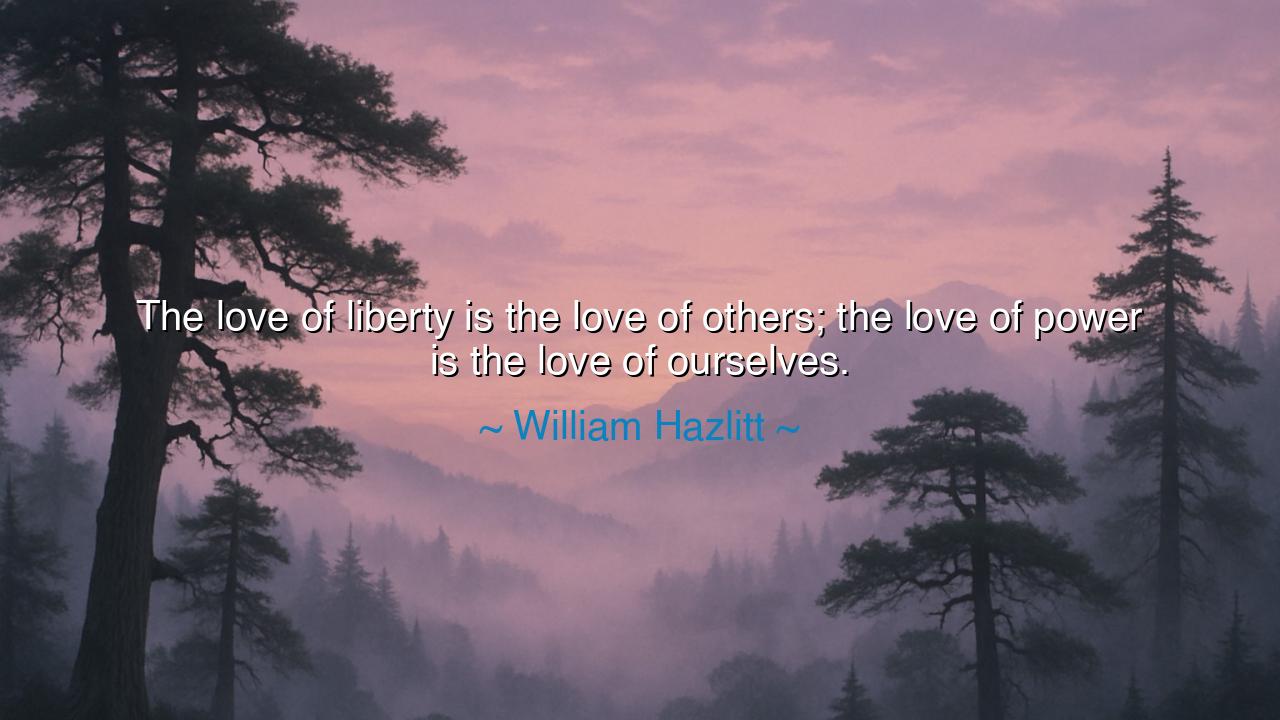
The love of liberty is the love of others; the love of power is






William Hazlitt, in his timeless wisdom, tells us, “The love of liberty is the love of others; the love of power is the love of ourselves.” These words echo through the ages, capturing the essence of human nature and the distinction between true freedom and self-serving dominance. Hazlitt draws a powerful distinction between two forces that often shape the course of human history: the desire for liberty, which fosters the freedom of all, and the pursuit of power, which seeks to elevate one’s own self over the well-being of others. True liberty, he suggests, is bound by love for others, while the love of power is a self-centered pursuit that disregards the needs and rights of others. In this way, Hazlitt lays bare the difference between virtuous freedom and the corrupt hunger for control.
The ancients, too, spoke of these forces in their own way, often dividing the soul’s desires into the higher and lower pursuits. Plato, in his writings, described the philosopher-king, a ruler who governs not for personal gain, but for the benefit of the common good. The philosopher, in his ideal state, seeks liberty for the people, not domination for himself. The pursuit of liberty, in Plato’s view, is the pursuit of virtue, a deep love for the collective well-being of society. Conversely, the tyrant, in contrast, seeks power—an insatiable desire to control others, to place self-interest above the needs of the many. This aligns with Hazlitt’s distinction: true liberty is an act of selflessness, while the hunger for power is the epitome of selfishness.
The story of Alexander the Great offers a powerful illustration of Hazlitt’s words. Alexander was a conqueror, a man who sought to wield power across vast lands. His campaigns were legendary, and his desire for dominance seemed boundless. Yet, his love of power, though it brought him glory, also led to great destruction and the subjugation of countless peoples. His empire was built on the backs of others, and while his power was immense, his legacy is not one of liberty or freedom. In contrast, Cyrus the Great, another conqueror, is remembered for his ability to respect the freedom of those he ruled. He understood that true leadership comes not from crushing others, but from recognizing their liberty and allowing them to live according to their own customs and beliefs. Cyrus’ love of liberty created a legacy that has been admired for millennia, while Alexander’s love of power left a legacy of division and oppression.
In our own time, the contrast between liberty and power is still evident in the actions of leaders and movements across the globe. Nelson Mandela, in his fight against apartheid, exemplified the love of liberty. His struggle was not for personal gain or recognition, but for the freedom of his people. Mandela’s vision was one of equality and justice, not control. His love for liberty led him to endure immense personal suffering, yet it was his selflessness that eventually brought about the liberation of millions. In contrast, those who sought to maintain apartheid were motivated by a love of power—an unyielding desire to keep control over others, to perpetuate systems of inequality and oppression. Mandela’s life reminds us that true freedom is rooted in the love of others, not the love of dominance.
Hazlitt’s words serve as a profound reminder that our actions in this world should be guided by love, but not a love of selfish control. When we pursue power, we are often blinded by our own ego—our need to be admired, to be in control, and to maintain dominance. But when we pursue liberty, we are driven by a love of community, a desire to lift others, to ensure their freedom and their dignity. The difference between these two pursuits lies not only in the consequences they bring to others, but in the very spirit that drives them. Power may offer fleeting satisfaction, but liberty offers lasting peace and prosperity.
So, children of the earth, take heed of Hazlitt’s words: the love of liberty is not the same as the love of power. To love liberty is to love your fellow beings and to desire their freedom as much as your own. It is an act of selflessness—a commitment to the collective good, to equality, and to justice. When you seek power, ask yourself if your desire is to serve others or to dominate them. True greatness comes not from the power you wield, but from the freedom you grant to others.
In your own lives, strive to be leaders who inspire others through love, not control. Let your actions be driven by the desire to empower, not to subjugate. Seek liberty, not for your own advantage, but for the well-being of all. In this way, you will not only honor the wisdom of the ancients, but you will contribute to a world that is defined by love, by justice, and by the lasting freedom of all. True power lies not in the ability to command, but in the ability to serve with love and respect for the liberty of others.






AAdministratorAdministrator
Welcome, honored guests. Please leave a comment, we will respond soon